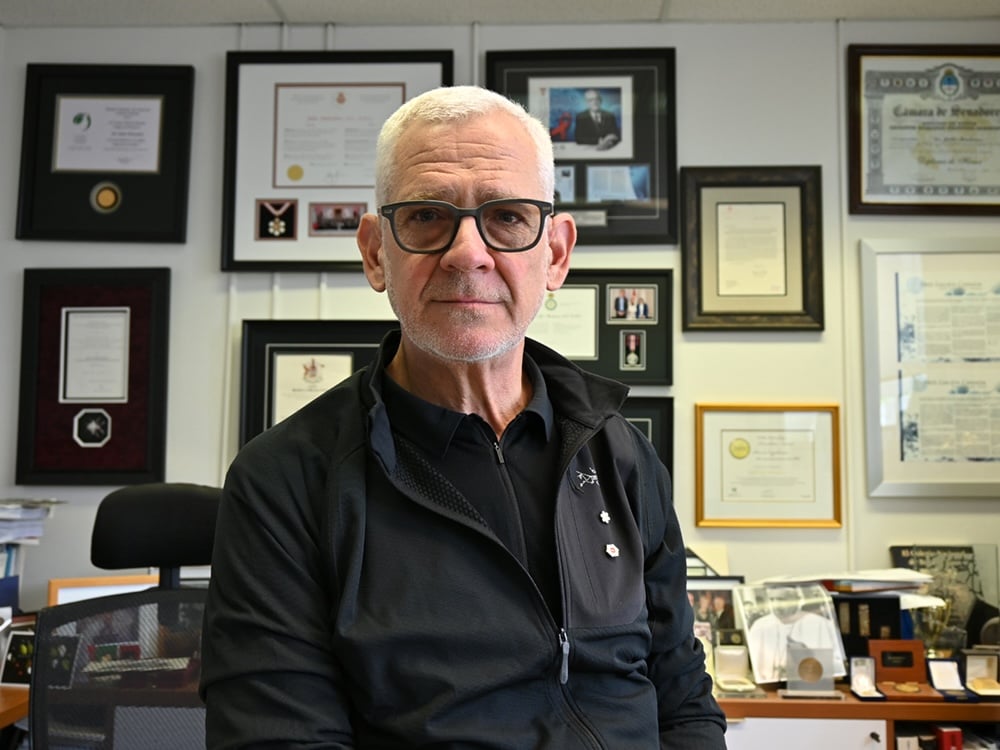Health
Canada Can Lead in Global HIV Fight as US Reduces Role

The United States has announced a significant reduction in its commitment to combating HIV/AIDS globally, prompting calls for Canada to take a more proactive role in the fight against this epidemic. Experts believe that with the right strategies, Canada could significantly impact the lives of those affected by HIV, particularly by adopting successful models already in place in regions like British Columbia.
Dr. Julio Montaner, a prominent researcher and the director of the British Columbia Centre for Excellence in HIV/AIDS, has been a leading voice in advocating for Canada’s enhanced involvement. He emphasizes that the province’s approach, which has dramatically improved health outcomes for individuals living with HIV, serves as a model for broader national and international efforts.
Innovative Strategies in British Columbia
British Columbia has historically been at the forefront of HIV treatment and prevention. The province implemented the “treatment as prevention” strategy, which has proven effective in reducing transmission rates. According to data from the British Columbia Centre for Excellence, new HIV infections in the province have dropped by approximately 42% since the program’s inception in 2010. This strategy relies on ensuring that individuals diagnosed with HIV receive antiretroviral therapy, which not only improves their health but also significantly lowers the risk of transmitting the virus to others.
Dr. Montaner argues that Canada can leverage its existing healthcare framework to expand access to these life-saving treatments nationwide. He points out that with increased federal funding and support, similar initiatives could be launched across the country, benefiting thousands more individuals living with HIV.
A Call to Action for Canadian Leadership
As the U.S. shifts its focus, the global community faces uncertainty regarding the future of HIV prevention and treatment initiatives. This transition presents an opportunity for Canada to step into a leadership role, leveraging its healthcare expertise and commitment to human rights.
The World Health Organization (WHO) and UNAIDS have both expressed concerns about the potential impact of decreased U.S. support on global HIV efforts. They emphasize that countries like Canada, with robust healthcare systems and a history of progressive public health policies, are well-positioned to fill the gaps left by the U.S.
Dr. Montaner’s vision extends beyond just national policies; he advocates for a coordinated international response to HIV. He believes that Canada can champion comprehensive strategies that include prevention, education, and treatment, while also addressing the social determinants of health that contribute to the epidemic.
In light of this evolving landscape, the Canadian government has an opportunity to not only enhance domestic policies but also play a crucial role on the world stage. A commitment to funding and supporting innovative programs could save countless lives and set a precedent for global health initiatives.
As Canada contemplates its next steps, the lessons learned from British Columbia’s successful model may serve as a guiding framework for future efforts. The call to action is clear: with decisive leadership and a commitment to comprehensive care, Canada can significantly influence the fight against HIV/AIDS, ensuring that progress continues even as global dynamics change.
-

 Lifestyle2 weeks ago
Lifestyle2 weeks agoChampions Crowned in Local Golf and Baseball Tournaments
-

 Science3 weeks ago
Science3 weeks agoMicrosoft Confirms U.S. Law Overrules Canadian Data Sovereignty
-

 Education2 weeks ago
Education2 weeks agoRed River College Launches New Programs to Address Industry Needs
-

 Technology2 weeks ago
Technology2 weeks agoDragon Ball: Sparking! Zero Launching on Switch and Switch 2 This November
-

 Technology3 weeks ago
Technology3 weeks agoWorld of Warcraft Players Buzz Over 19-Quest Bee Challenge
-

 Technology3 weeks ago
Technology3 weeks agoGoogle Pixel 10 Pro Fold Specs Unveiled Ahead of Launch
-

 Science2 weeks ago
Science2 weeks agoChina’s Wukong Spacesuit Sets New Standard for AI in Space
-

 Science3 weeks ago
Science3 weeks agoXi Labs Innovates with New AI Operating System Set for 2025 Launch
-

 Science3 weeks ago
Science3 weeks agoTech Innovator Amandipp Singh Transforms Hiring for Disabled
-

 Technology3 weeks ago
Technology3 weeks agoNew IDR01 Smart Ring Offers Advanced Sports Tracking for $169
-

 Technology3 weeks ago
Technology3 weeks agoGlobal Launch of Ragnarok M: Classic Set for September 3, 2025
-

 Technology3 weeks ago
Technology3 weeks agoFuture Entertainment Launches DDoD with Gameplay Trailer Showcase
-

 Health2 weeks ago
Health2 weeks agoB.C. Review Urges Changes in Rare-Disease Drug Funding System
-

 Technology3 weeks ago
Technology3 weeks agoHumanoid Robots Compete in Hilarious Debut Games in Beijing
-

 Science3 weeks ago
Science3 weeks agoNew Precision Approach to Treating Depression Tailors Care to Patients
-

 Technology3 weeks ago
Technology3 weeks agoInnovative 140W GaN Travel Adapter Combines Power and Convenience
-

 Business3 weeks ago
Business3 weeks agoNew Estimates Reveal ChatGPT-5 Energy Use Could Soar
-

 Health2 weeks ago
Health2 weeks agoRideau LRT Station Closed Following Fatal Cardiac Incident
-

 Health3 weeks ago
Health3 weeks agoGiant Boba and Unique Treats Take Center Stage at Ottawa’s Newest Bubble Tea Shop
-

 Science3 weeks ago
Science3 weeks agoNew Study Reveals Surprising Impact of Gratitude on Helping Behaviors
-

 Technology3 weeks ago
Technology3 weeks agoQuoted Tech Launches Back-to-School Discounts on PCs
-

 Technology3 weeks ago
Technology3 weeks agoDiscover the Relaxing Charm of Tiny Bookshop: A Cozy Gaming Escape
-

 Technology3 weeks ago
Technology3 weeks agoBorderlands 4 Promises Massive Changes with 30 Billion Guns
-

 Lifestyle2 weeks ago
Lifestyle2 weeks agoVancouver’s Mini Mini Market Showcases Young Creatives










